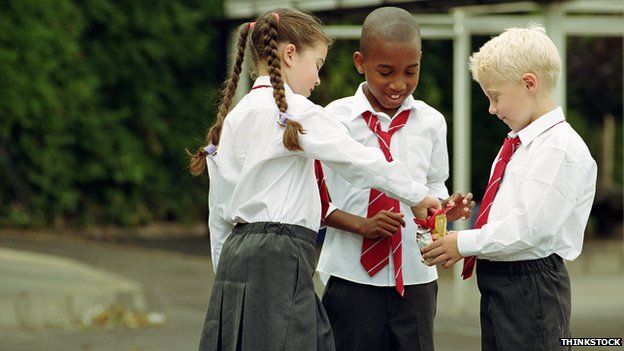Primary friend study finds class, not ethnicity, divide
- Published

Researchers interviewed children aged eight to nine about friendships in and out of school
Children in primary school are more likely to have friends in a different ethnic group than a different social class, research suggests.
Adults, while valuing the diversity around them, were also found to gravitate towards "people like us".
The study of social interactions was conducted in three London primary schools situated in diverse areas.
But it found that out of school, children tended to spend time with those who were similar to them.
The researchers from University College London's Institute of Education (IoE) and the University of Surrey wanted to find out if living in a diverse area meant local populations also had diverse friendship groups.
'Social embarrassment'
The researchers conducted 114 interviews with children in Year 4 (aged eight to nine), their parents, school governors and staff and spent some 300 hours observing social interactions in the classroom, playground and at school events.
They also looked at children's drawings of their friendship networks.
Nearly all the children taking part in the survey had friendships across different ethnic groups and class backgrounds, but when asked about best friends there were fewer across different social classes.
Things were different outside the classroom, the report said, because their parents "managed their friendships out of school".
The children surveyed were in Year 4 (aged eight to nine)
It warned this could reinforce cultural and particularly social differences, as children tended to spend time after school with those who were similar to them.
Prof Carol Vincent from UCL said: "When it comes to playdates, there may be concern among parents about trust and safety.
"Some spoke of being unsure about things such as the degree of parental supervision and the food their children would be given in another parent's house".
'Social awkwardness'
Yet the vast majority of parents, the report found, "voiced approval of the diversity of the areas in which they lived" and some had specifically chosen the school because of its diversity.
Even so, in their own friendships both in and out of school, the parents were found to mix less than their children with people from different backgrounds.
"When we discussed with the parent participants why the degree of adult mixing across difference was small, they responded that making friendly overtures to people who were different involved considerable effort and risked social awkwardness," the researchers said.
"Making friends with 'people like me' appeared to offer shared interests, a basis for trust and points of reference from the start."
Primary schools were found to be a source of friendship
The study also found that, as with the children, class was a more formidable barrier than ethnicity.
"The adult friendships that were made across the difference were, like those of the children, more likely to cross ethnic difference than to cross class difference," the report said.
Some parents said they would like their friendship groups to be as mixed as their children's, but expressed "social embarrassment, under-confidence and awkwardness about approaching people from different ethnic and cultural groups".
Even with adults tending to be friends with people similar to themselves, the researchers concluded that primary schools still remained key sites in which social interactions took place.
"The adult participants found school to be a source of friendship for themselves, as well as their children," the study said.
They said even a friendly "Hi, how are you?" between parents was felt to be important in creating a positive atmosphere at school.